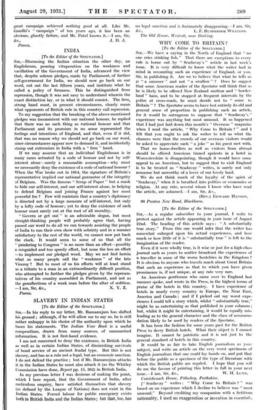INDIA
[To the Editor of the SPECTATOR.] SIR,—Discussing the Indian situation the other day, an Englishman, pouring vituperation on the weakness and vacillation of the Government of India, advanced the view that, despite solemn pledges, made by Parliament, of further self-government for India, we should now go back on our word, cut out the last fifteen years, and institute what he called a policy of firmness. This he distinguished from repression, though it was not easy to understand wherein the exact distinction lay, or in what it should consist. The firm, strong hand must, in present circumstances, clearly mean what opponents of British rule in this country call repression.
To my suggestion that the breaking of the above-mentioned pledges was inconsistent with our national honour, he replied that there was no such thing as rational honour and that Parliament and its promises in no sense represented the feelings and intentions of England, and that, even if it did, that was no reason why we should not go back on our word, since circumstances appear now to demand it, and incidentally stamp out extremism in India with a " firm " hand.
If we may assume that an individual Englishman is in many cases actuated by a code of honour and not by self- interest alone—surely a reasonable assumption—why must we necessarily deny the existence of a code of national honour ? When the War broke out in 1914, the signature of Britain's representative implied our national guarantee of the integrity of Belgium. Was the famous "Scrap of Paper" but a mask to hide our self-interest, and our self-interest alone, in helping to defend Belgium and joining France against her most powerful foe ? Few will maintain that a country's diplomacy is directed not by a large measure of self-interest, but only by a lofty code of honour ; yet to deny the existence of such honour must surely cut at the root of all morality.
"Govern or get out" is an admirable slogan, but most straight-thinking people will probably agree that, having passed our word to do all we can towards assisting the people of India to run their own show with sobriety and in a manner satisfactory to the rest of the world, we cannot now put back the clock. It would seem to some of us that all the "pandering to Congress" is no more than an effort—possibly a misguided and too speedy effort, but none the less an effort —to implement our pledged word. May we not find herein what so many people call the " weakness " of the late Viceroy ? But to most of us his efforts will at least stand as a tribute to a man in an extraordinarily difficult position, who attempted to further the pledges given by the represen- tatives of his country assembled in Parliament, and not as the genuflections of a weak man before the altar of sedition.


























 Previous page
Previous page